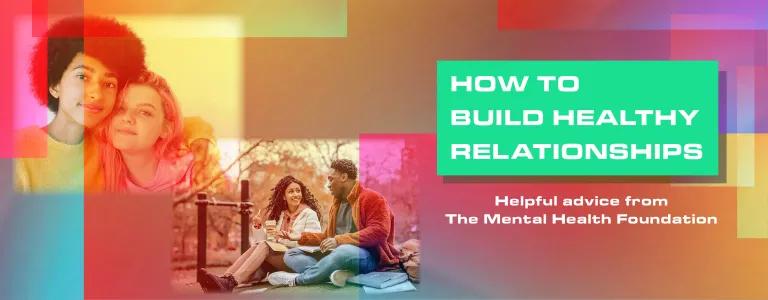
How To Build Healthy Relationships
Written by The Mental Health Foundation, a leading charity who challenge the way things are done and create fundamental change in the UK’s approach to mental health.
Our relationships with others can have a major impact on our mental health. Whether these are our relationships with friends, family or romantic partners, they can all influence how we feel.
Our research found that being socially connected to family, friends and our local community can help us to feel happy, physically healthier and improve our wellbeing. But it’s not just having social connections that is important, it’s about the quality of these relationships. Having strong, stable and fulfilling relationships help tackle feelings of loneliness, isolation and improve our mental health.
At the Mental Health Foundation we got together with a group of young people to explore what makes a healthy relationship and they came up with these six top tips:
Get to know yourself
Taking the time to appreciate yourself and get in touch with your emotions can help you understand what you need from relationships. Doing this can also help you communicate more clearly and effectively.
It can be helpful to think about the qualities that you value in your relationships. The young people we spoke with said the qualities they value were:
- Respect
- Communication
- Boundaries
- Honesty
- Trust
Action: Think about what qualities you most value in relationships and create your own list. Are these qualities the same in family, friendship and romantic relationships?

Put in the work
Healthy relationships take work, they need commitment and willingness to be accommodating to each other’s needs. We often know this to be true in romantic relationships but sometimes forget this is important in friendships and family relationships too.
Action: Listen to our podcast on the importance of friendships on our mental health.
Set and respect boundaries
Setting boundaries is not only about what you don’t want or like in your relationships, but also about letting the people around you know what you appreciate.
Each of us will have different boundaries. Thinking about what they are, and communicating them with the people in your life can take pressure off your relationships by not feeling like you need to commit to anything unrealistic. For example, perhaps you value time alone whereas your partner likes to spend a lot of time together. Realising this and talking to them about it will make the relationship stronger and healthier for you both.
Action: Think about what some of your boundaries are, perhaps talk it through with a friend and learn about what theirs are.

Talk and Listen
All relationships have disagreements and that’s okay. What matters is how you talk and listen to one another to overcome these difficulties.
Managing conflict and having difficult conversations can feel uncomfortable and sometimes it feels easier to avoid them, but talking about things that upset us can strengthen our relationships with others.
Always remember to listen to understand, rather than listening to respond.
Action: Check out this Instagram post from our campaign. Read through the sentence starters for having difficult conversations. How might you start a difficult conversation?
Let go of control
A lot of life is about how we react to our experiences and encounters. Knowing that you can only really control what you do and not what anyone else does will save you time and stress.
Remember that everyone has different past experiences that may influence how they respond or react to new experiences. It is important to treat other people with empathy and understanding, you can’t always know what someone else has been through.
Action: Read H's story about their experiences of navigating healthy relationships. How do your past relationships influence your new ones?

Reflect and learn
Think about and learn from your current and past relationships, what works well and what doesn’t. This can help you build stronger and healthier relationships in the future.
Reflection can also help you better express yourself and understand others. Sometimes being angry with someone comes from a place of feeling hurt and upset - if you can recognise that, you can communicate it, and build better relationships with others.
We are used to hearing about red flags in relationships - the things that we should avoid - but what about green flags? What should a healthy relationship look and feel like? The young people we worked with said that some of their green flags were:
- Everyone feeling safe and like their boundaries were respected
- Feeling as though you can be who you want to be
- Recognising that differences are inevitable, but being able to talk about them

Action: Reflect on the relationships that work best in your life, what qualities do these relationships have, and how can you bring these qualities into other relationships? Read through the green flags from our campaign – are these important to you? What are your green flags?
For more information on the campaign, you can check out the whole conversation here.



